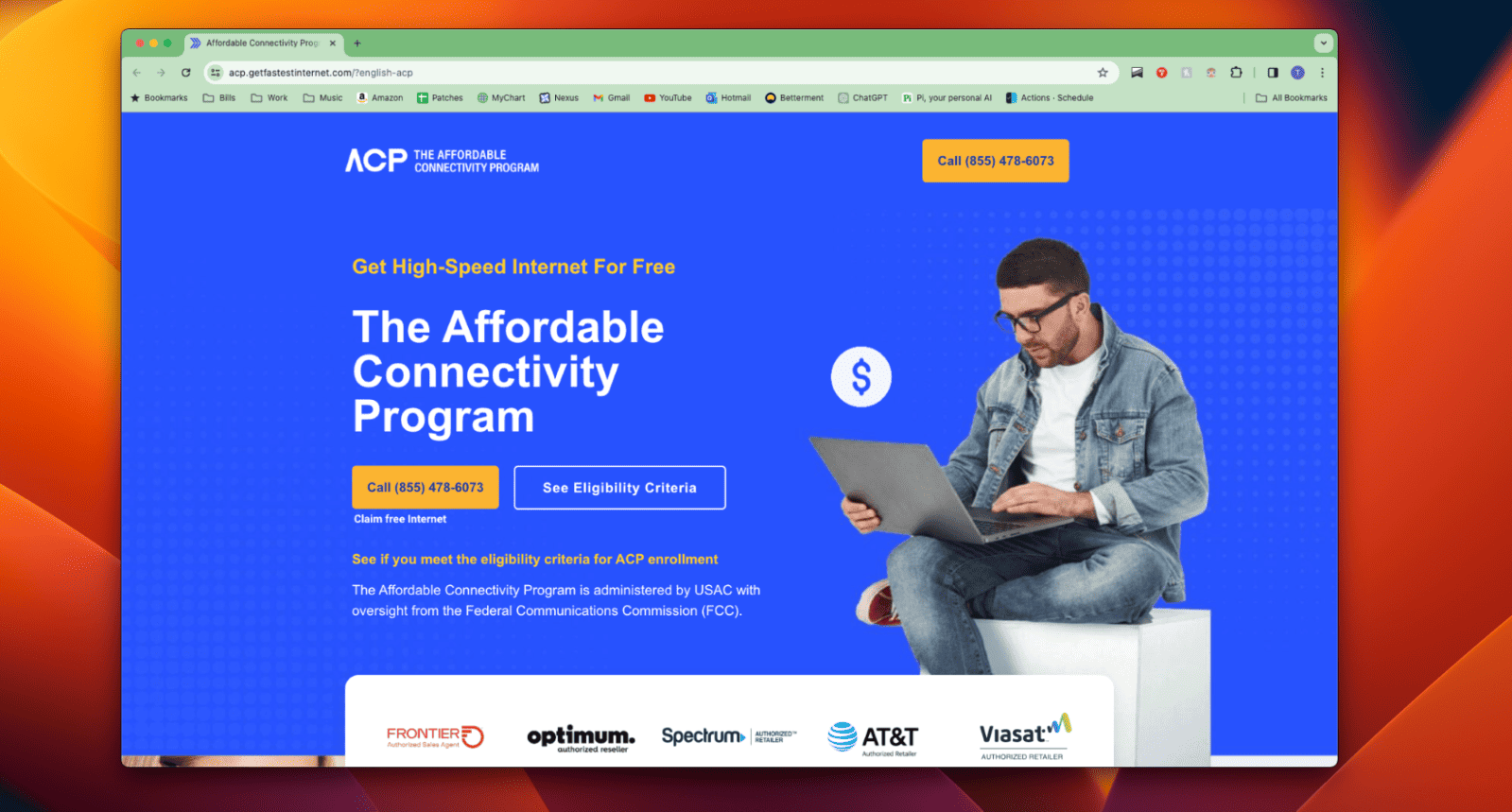Over the last few years, the Affordable Connectivity Program (ACP) has been an invaluable tool for millions of Americans, aiming to bridge the digital divide by providing discounted internet services to eligible low-income households. However, this well-intentioned program has become a fertile ground for scammers, exploiting the vulnerabilities of those it seeks to help. With the ACP set to end enrollment on February 7th, there will likely be a rush among consumers to register before the deadline, potentially exacerbating the issue.
In order to better understand how these schemes operate, we engaged with several of the offending websites directly to see what they were really offering. What we found is a mixture of misleading claims about the program, a tendency to upsell vulnerable consumers on extra features and unneeded “products”, and false claims about “free” internet service.
Key Findings
- Scammers extensively misuse the Affordable Connectivity Program, targeting low-income households with deceptive tactics.
- These individuals are running ads on search engines to draw in consumers looking for affordable plans ahead of the ACP closing enrollment on February 7th
- Tactics include misleading websites offering costly plans, call centers upselling under the guise of ACP discounts, and false claims of free services.
- Specific scams range from selling unnecessary “how-to” guides for ACP enrollment to door-to-door sales pitches promising non-existent instant discounts.
- Consumers are advised to recognize red flags like unsolicited offers and to safely apply for ACP benefits through official channels only.
ACP Scam Archetypes
The scams we encountered essentially boil down to the following:
- Misleading call center representatives
- Unnecessary “product” offers
- In-person scams involving money changing hands

Misleading Reseller Websites
These websites mimic the appearance and offerings of the official ACP but with a deceptive twist. They lure consumers with promises of free internet services, only to trap them into expensive, long-term plans that far exceed the ACP’s scope and cost.
Consumers who call these services might end up signing up for an internet plan far more costly than they anticipated. Our team called one such call center and was encouraged to sign up for a “high-speed Spectrum” plan that ended up costing over $140 per month, despite being reassured that the “ACP discount would bring it down”.
In another instance, we called a number claiming to offer “high speed internet for free,” only to be told that they could offer us a fiber internet package that is normally $55 with a $100 installation fee for free, and all we had to do was pay a $10 fee instead. This is not reflective of the ACP, which only offers a discount of up to $30 per month on internet services.

Misleading Information Products
Some sites exploit the perceived complexity of the ACP sign-up process by selling “how-to” guides in PDF format. These products target less tech-savvy individuals, taking advantage of their lack of knowledge about the ACP. They sell information that is freely available through official sources, thus preying on the uninformed.
We purchased the PDF in question and can confirm that it contained no details that cannot be found below, or on the FCC’s official website for free. Additionally, when we gained access to the dashboard website after paying, we were brought to this page seemingly offering a “free tablet” (however, the page appeared to be broken as of this writing):

Finally, although the website in question claims to help users “never pay for internet again”, it does not offer any specific benefit or offer to back this claim up. The ACP offers users a $30 per month discount on qualifying internet plans, which may or may not cover the entire cost depending upon what is available in your area.
Door-to-Door Sales Scams
This one is more difficult to track, but there have been several reports of salespersons going door-to-door, falsely claiming to offer “instant discounts” on internet service as part of the ACP. These scams mislead consumers about how the ACP works, often promising benefits that are not part of the actual program. The ACP discounts are not provided instantly but through a structured application process.
Often, these fake reps will require a deposit to finalize the signup, which is not genuine. The ACP is free to apply to, and can be done online by consumers directly.
How to Identify and Avoid Scams
Scams like the ones above are part of a growing issue – between 2020 and 2022, reports of fraud/scams related to broadband access, cost, or speed increased 18% according to Federal Trade Commission data (rising from 12,369 reports to 14,645 reports).
Recognizing Red Flags
- Scams can be identified by unsolicited offers, high-pressure sales tactics, and requests for personal information. Overly attractive promises should be treated with skepticism.
- Stay cautious with offers deviating from the ACP’s official details. If something seems too good to be true, it likely is. The discount will never be more than $30 per month.
- Be wary of “promoted” results in Google and other search engines, as unofficial websites will often use this feature to get to the top of your search results and entice you to click through.
Safe Application Practices
- Apply for ACP benefits via official websites and government portals only.
- Protect personal information online, particularly sensitive data like social security numbers.
Resources for Assistance
- Use official channels like the FCC and USAC websites for inquiries and assistance.
- Report suspected scams to authorities to prevent further exploitation and help in taking action against fraudsters.
- You can submit a report to the FCC here if you find a suspected scam.
Applying for the Affordable Connectivity Program (ACP) Officially
To apply for the ACP:
- Visit the Official Website: The first step is to go to the official Affordable Connectivity Program website.
- Check Eligibility: Determine if you meet the eligibility criteria, which may include income level or participation in certain government assistance programs.
- Gather Required Documents: Prepare necessary documentation, such as proof of income or program participation.
- Complete the Application: Fill out the application form accurately with all required details.
- Submit and Follow Up: After submitting the application, keep track of its status and respond to any additional requests for information.
This process ensures a safe and legitimate way to apply for the ACP benefits, avoiding potential scams.
Editor’s Note: If you’ve encountered an ACP scam yourself, we’d love to hear from you. Please drop us a note with details at press@broadbandnow.com.

